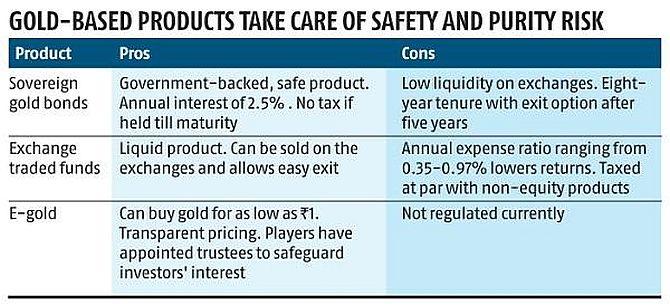Those wishing to participate in a jewellery scheme should opt for large, reputed, national-level players as the chances of such entities absconding or defaulting are lower, suggests Sanjay Kumar Singh.

According to media reports, the promoters of Kerala-based Goodwin Jewellers have fled, leaving a large number of customers, especially in Maharashtra, staring at the prospect of losing their money.
The jeweller ran a gold jewellery scheme and also a deposit scheme, where it promised a return of 16 per cent.
Some time ago, the promoter of Bengaluru-based IMA Jewels had also gone missing, leaving customers in a similar predicament.
Gold jewellery schemes are very popular in India.
They run along the following lines.
The customer visits a jeweller and zeroes in on a piece of jewellery.
If she does not have a lump sum amount, she agrees to pay in instalments.
She could, for instance, pay for 11 months.
The jeweller then chips in and pays the 12th month's instalment, after which the customer gets possession of the piece of jewellery.
Customers like these schemes as they allow them to buy something valuable through regular, small savings.
Jewellers promote them because the cash inflow helps them meet their working capital needs.
However, these schemes carry certain risks.
Explaining the growing stress within the jewellery business, Ajay Kedia, director, Kedia Commodities says: "Many traditional jewellers have increased the number of their outlets rapidly in recent years, leading to a rise in operating costs.
"But margins in jewellery-making have shrunk due to the supply of machine-manufactured jewellery.
"And with gold imports remaining steady at about 750 tonnes annually, the demand for jewellery-making has not grown all that rapidly."
So long as a jeweller uses customers' money to meet his working capital needs, there is usually no problem.
But many of them lend surplus cash to liquidity-starved businesses like real estate.
Losses there take a toll on the core business, leading to default.

Experts say such incidents are an opportunity to bring in much-needed reforms.
"The industry needs to set up a watchdog whose task should be to call out errant jewellers. It also needs to run large-scale awareness campaigns against malpractices," says Somasundaram PR, managing director, India, World Gold Council.
He also suggests that banks should offer gold-accumulation schemes wherein the customer is allowed to deposit small amounts of money at regular intervals.
An equivalent amount of gold should be credited to her account, and whenever she wants, she should be able to take delivery of the accumulated gold.
Customers, too, need to be cautious about the entities they deal with.
Avoid unregulated deposit schemes run by small jewellers.
"If you go for them just because they offer higher returns, you run the risk of losing your capital," says Ankur Kapur, managing partner, Plutus Capital. Those wishing to participate in a jewellery scheme should opt for large, reputed, national-level players as the chances of such entities absconding or defaulting are lower.
Any gold accumulation scheme you go for should fulfil one criterion. "When you deposit money, the entity running the scheme should purchase gold, allocate it in your name, and preferably keep it in a depository. Even in the event of that entity turning insolvent, the customer's gold then is safe with the custodian," says Somasundaram.
Finally, several products like sovereign gold bonds, gold exchange-traded funds (ETFs), and digital or e-gold have now become available where your chances of incurring losses are nil or very low.
It is better to use them for accumulation rather than buy physical gold as there is no risk of theft and no purity-related issues.












 © 2025
© 2025